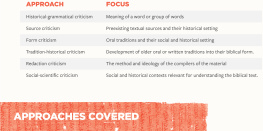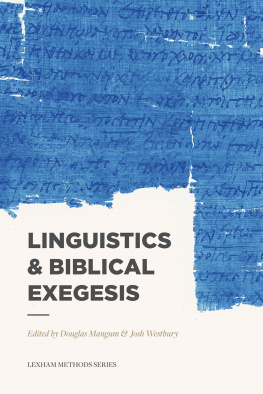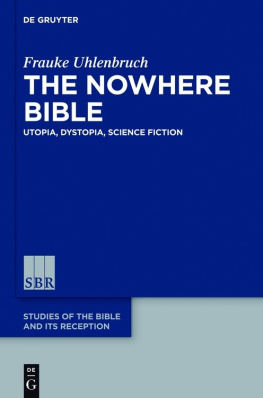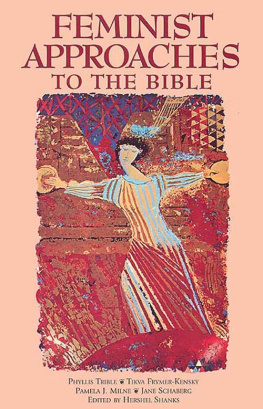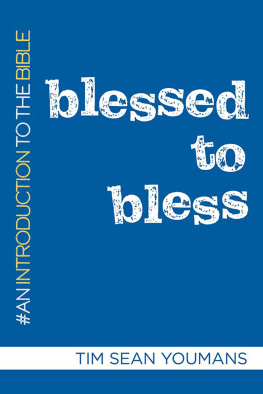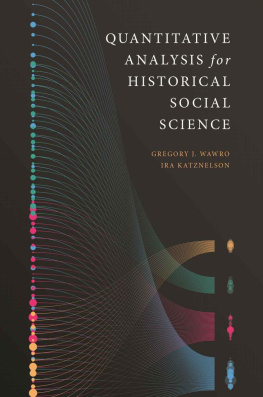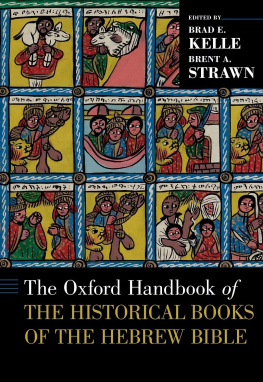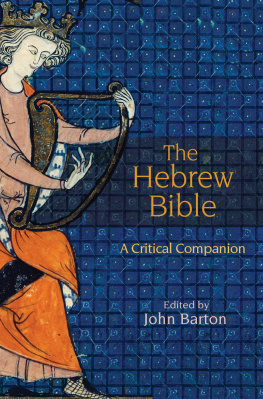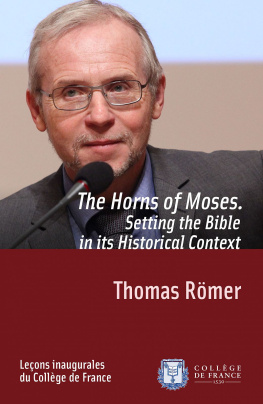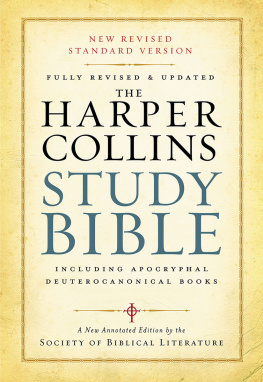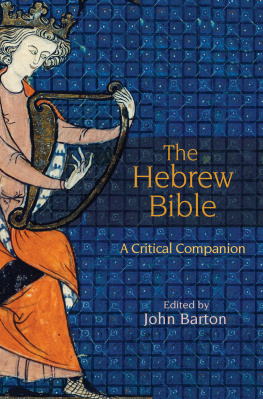Lexham Methods Series
Volume 3
Social & Historical Approaches to the Bible
Edited by
Douglas Mangum
and
Amy Balogh
Lexham Methods Series: Volume 3: Social & Historical Approaches to the Bible
Copyright 2016 Lexham Press
Lexham Press, 1313 Commercial St., Bellingham, WA 98225
http://www.lexhampress.com
You may use brief quotations from this content in presentations, books, or articles. For all other uses, email Lexham Press for permission: .
All Scripture quotations are from the Lexham English Bible ( LEB ) or are the authors own translation, unless otherwise indicated. Copyright 2013 Lexham Press.
Scripture quotations marked ( ESV ) are from The Holy Bible, English Standard Version (ESV), copyright 2001 by Crossway, a publishing ministry of Good News Publishers. Used by permission. All rights reserved.
Scripture quotations marked ( NIV ) are taken from the Holy Bible, New International Version, NIV. Copyright 1973, 1978, 1984, 2011 by Biblica, Inc. Used by permission of Zondervan. All rights reserved worldwide.
Scripture quotations marked ( NRSV ) are from the New Revised Standard Version Bible, copyright 1989 by the Division of Christian Education of the National Council of the Churches of Christ in the U.S.A. Used by permission. All rights reserved.
Table of Contents
Amy Balogh and Douglas Mangum
Judith Odor
Amy Balogh, Dan Cole, and Wendy Widder
Gretchen Ellis
Gretchen Ellis
Jeffery Leonard
Coleman Baker and Amy Balogh
The Lexham Methods Series introduces a variety of approaches to biblical interpretation. Due to the fields long history, however, the coverage is necessarily selective. This series focuses on the major areas of critical biblical scholarship and their development from the 19th century to the early 21st century . While we recognize that theological approaches to interpretation have played an important role in the life of the Church, this series does not engage the wide variety of hermeneutical approaches that arise from specific theological readings of the biblical text.
The methods discussed here include the broad movements in biblical criticism that have helped define how biblical scholars today approach the text. Understanding the basics of textual criticism, source criticism, form criticism, tradition history, redaction criticism, linguistics, social-scientific criticism, canonical criticism, and contemporary literary criticism (rhetorical, structural, narrative, reader-response, post-structural) will help illuminate the assumptions and conclusions found in many scholarly commentaries and articles.
Each approach to biblical interpretationeven those that are not explicitly theologicalcan be defined according to a guiding presupposition that informs the method.
Textual criticism: Reading the text to identify errors in transmission and determine the best text
Source criticism: Reading the text to find the written sources the author(s) used
Form criticism: Reading the text to find the oral traditions the author(s) used
Tradition-historical criticism: Reconstructing the historical development of the traditions identified by form criticism
Redaction criticism: Reading the text to understand how it was put together and what message the text was meant to communicate
Canonical criticism: Reading the final form of the text as Christian Scripture
Rhetorical criticism: Analyzing the text for the rhetorical effect of the literary devices the writers used to communicate and persuade
Structural criticism: Analyzing the text in terms of contrast and oppositions, recognizing that contrast is believed to be the essence of meaning within a cultural, linguistic, or literary system
Narrative criticism: Reading the text as a narrative and paying attention to aspects including plot, theme, and characterization
Linguistic approach: Analyzing the text using concepts and theories developed by linguistics
Social-scientific approach: Analyzing the text using concepts and theories developed in the social sciences
The Lexham Methods Series defines these approaches to biblical interpretation, explains their development, outlines their goals and emphases, and identifies their leading proponents. Few interpreters align themselves strictly with any single approach. Contemporary Bible scholars tend to use an eclectic method that draws on the various aspects of biblical criticism outlined above. Many of these methods developed in parallel, mutually influenced each other, and share similar external influences from literary theory and philosophy. Similarly, ideas and questions arising from one approach often directly influenced the field as a whole and have become common currency in biblical studies, even though the method that generated the concepts has been radically reshaped and revised over the years.
In introducing a variety of methods, we will address each method as neutrally as possible, acknowledging both the advantages and limitations of each approach. Our discussion of a particular method or attempts to demonstrate the method should not be construed as an endorsement of that approach to the text. The Lexham Methods Series introduces you to the world of biblical scholarship.
Reference Works |
AEL | Ancient Egyptian Literature. M. Lichtheim. 3 vols. 19711980 . |
ANET | Ancient Near Eastern Texts Relating to the Old Testament. J. B. Pritchard. 1954 . |
AYBD | Anchor Yale Bible Dictionary (formerly Anchor Bible Dictionary). D. N. Freedman. 1992 . |
BDAG | W. Bauer, F. W. Danker, W. F. Arndt, and F. W. Gingrich. A Greek-English Lexicon of the New Testament and Other Early Christian Literature. 3d ed. 1999 . |
BDB | Enhanced Brown-Driver-Briggs Hebrew and English Lexicon |
BEB | Baker Encyclopedia of the Bible. W. A. Elwell. 2 vols. 1988 . |
BHRG | A Biblical Hebrew Reference Grammar. Christo van der Merwe, Jackie Naud, and Jan Kroeze. 1999 . |
COS | The Context of Scripture. W. W. Hallo and K. L. Younger. 3 vols. 19972003 . |
DCH | Dictionary of Classical Hebrew. D. J. A. Clines. 1993 . |
DDD | Dictionary of Deities and Demons in the Bible. K. van der Toorn, B. Becking, and P. W. van der Horst. 1995 . |
DJG | Dictionary of Jesus and the Gospels. J. B. Green and S. McKnight. 1992 . |
DLNT | Dictionary of the Later New Testament and Its Developments. R. P. Martin and P. H. Davids. 1997 . |
DPL | Dictionary of Paul and His Letters. G. F. Hawthorne and R. P. Martin. 1993 . |
DNTB | Dictionary of New Testament Background. S. E. Porter and C. A. Evans. 2000 . |
EDB | Eerdmans Dictionary of the Bible. D. N. Freedman. 2000 . |
EDNT | Exegetical Dictionary of the New Testament. |

